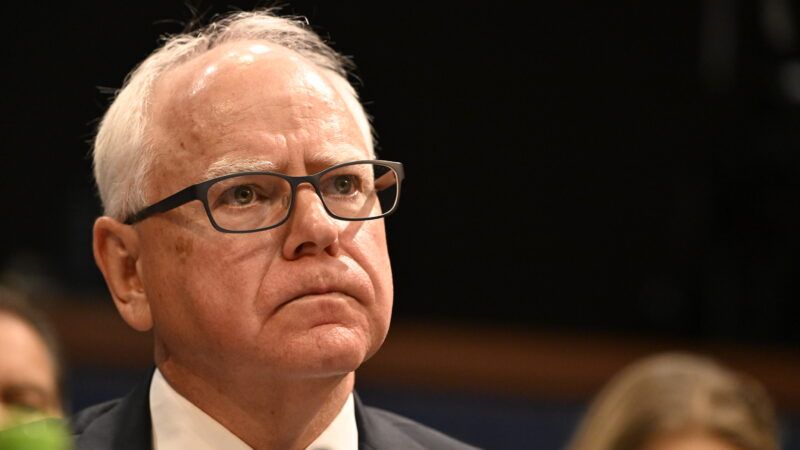Walz's Gun Plan Wouldn't Stop Shootings, but It Might Shred Civil Liberties
Minnesota's proposed firearm restrictions raise serious constitutional questions—and offer little in return.

Minnesota Democratic Gov. Tim Walz announced on Tuesday plans to hold a special legislative session to introduce new statewide gun control measures, including a ban on "assault weapons." This comes in the wake of last week's tragic mass shooting at Annunciation Catholic School in Minneapolis, which left 21 injured and 2 dead.
Despite assurances that the proposals would not infringe upon Second Amendment rights, Walz's proposed measures raise significant constitutional concerns. In addition to a ban, Walz proposed a law that would mandate stricter standards for safe storage, increased funding for mental health treatment, and further expansion of Minnesota's 2023 red flag laws.
The governor's statements drew mixed reactions, mostly along partisan lines, with state Democrats largely supportive. Echoing Walz's call, Minneapolis Mayor Jacob Frey, St. Paul Mayor Melvin Carter, and eight other city leaders urged repeal of Minnesota's 1985 preemption statute, which bars local governments from enacting stricter gun laws than the state. Even if broader legislation fails, they insist cities must be able to act.
State Republicans, despite expressing their willingness to work with Democrats to address gun violence, have predictably voiced skepticism toward the proposed measures, citing concerns about potential civil liberties violations, questioning the governor's intentions, and ultimately doubting that a bipartisan resolution could be reached.
Walz still seems willing to work with Republicans. But whatever kind of legislation the special session produces—particularly restrictions and/or local bans on common firearms—will likely face constitutional challenges if ratified.
The Supreme Court's 2022 decision in New York State Rifle & Pistol Association, Inc. v. Bruen established that all state and local-level gun regulations must align with firearm laws that were in place at the time of the Constitution's framing. Since then, courts have overturned various state-level gun control laws, including bans on so-called "assault weapons," for not reflecting that standard—among them, Illinois' attempted prohibition of semiautomatic rifles and Tennessee's ban on concealed carry in public parks.
In Minnesota, these complexities extend further. The push to repeal the state's preemption law—designed to prevent municipalities from passing stricter firearm ordinances than the state—would unravel decades of legal consistency, exposing residents to a fragmented landscape of local regulations and expanding the potential for municipal overreach. However, concerns over state overreach are not merely theoretical.
Since red flag laws first emerged in 1999, civil liberties advocates have warned of due process erosion, as courts have authorized firearm seizures through ex parte orders with minimal evidentiary standards. In many cases, individuals lose their constitutional rights without being criminally charged or having a chance to dispute allegations. This lack of clarity can lead to deadly misunderstandings, as in 2018, when Maryland resident Gary Willis was killed by police while being served a red flag order issued without his knowledge. Extreme though it was, the case underscores how such laws can escalate risk and undermine core constitutional protections.
Rather than address these deficiencies, Walz appears ready to double down, suggesting not only an expansion to his earlier red flag laws, but also broader state authority to disarm citizens based on subjective assessments of future risk. If the current trajectory continues, Minnesota may soon serve as a national test case for how far civil liberties can be curtailed in the name of safety.
